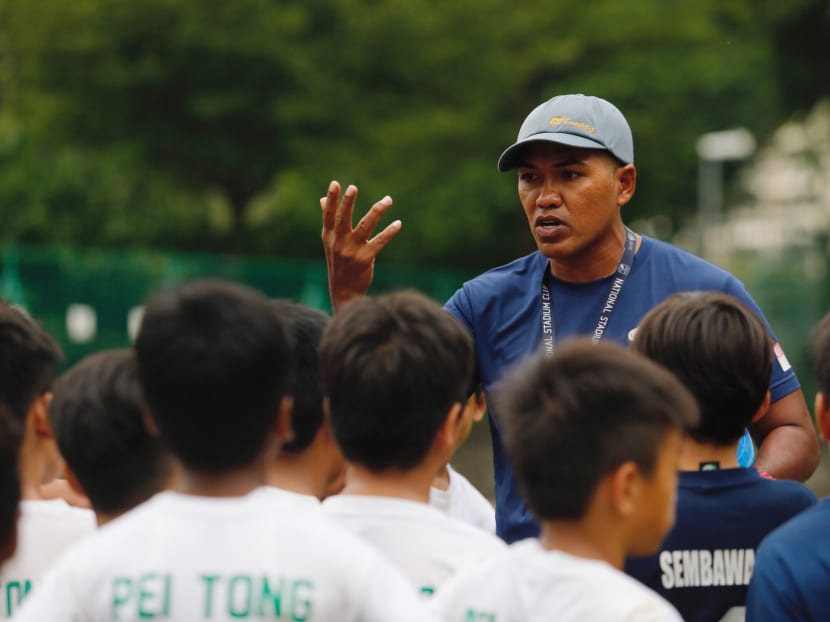The neighbourhood schools rugby coach with the golden touch
SINGAPORE – If you are a neighbourhood primary school that harbours dreams of excelling in rugby, consider giving Peerose Shah a call.

Endeavour Primary School head coach Peerose Shah speaking to the boys from Sembawang and Pei Tong Primary School during rugby training at Endeavour Primary School on 21th July 2017. Photo by Najeer Yusof
SINGAPORE – If you are a neighbourhood primary school that harbours dreams of excelling in rugby, consider giving Peerose Shah a call.
The 45-year-old former Singapore international has a proven track record, having first led Yung An Primary (now Lakeside Primary) to the national Under-12 championships crown in 2002.
That was followed by the U-13 triumph with Pei Tong in 2005 – the U-12 competition became U-13 from 2003 onwards – and U-11 titles with Chongzheng and West View in 2009 and 2014 respectively.
Peerose’s latest achievement came this year when he took Endeavour to their first ever U-11 national final and led them to a 7-5 win over powerhouses Anglo-Chinese School (Junior).
Two other neighbourhood schools that he coaches, Pei Tong and Sembawang, also finished fourth and fifth respectively – proving that these teams can mix it up with the traditional big boys.
According to online portal Red Sports, which covers the local school sports scene extensively, St. Andrew’s (Junior) have won seven of the U-11 titles since 2005. ACS (J) won in 2015 and 2016 while ACS (Primary) won in 2009. This dominance was only broken with West View three years ago, and now, Endeavour.
At U-13 level, Peerose’s Sembawang finished runners-up to ACS (J) this year in April. It was the latter’s second title after their 2015 triumph. St. Andrew’s stranglehold at this level is astonishing, with 13 titles stretching back to 1997, though their most recent one was in 2012. Since 1997, ACS (Pri) have won three crowns, with the dominance only broken by Yung An and Pei Tong with one title each.
Peerose’s achievements often come from a starting point of almost zero, as was the case with Endeavour, who started their team in 2009 – one year after the school’s founding. With time and belief, these neighbourhood schools can rise to the challenge.
“Belief is the most powerful tool,” said Peerose – a point he would reiterate many times to TODAY during this interview. “I don’t believe in powerhouses... I was a police officer from 1992 to 1997 and after that, I resigned to become a professional rugby coach.
“In 1998, I went to New Zealand to get my coaching accreditation. All this time, I have just (been) following the passion and the belief. I believe I can do it and this is where I am, after 20 years in the job.”
He points out that neighbourhood schools face certain disadvantages during competitions, likening it to people’s perception of brands.
“An iPhone or Adidas product against a lesser-known brand counterpart, which one would you choose?” he said. “So when you play your games, the tendency of certain calls to be made for them (powerhouse schools) is higher than for you.
“You will be scrutinised more because you are not the favourite… so we need to overcome that.”
This is done by being as meticulous as possible in the preparations and ensuring no shortcuts are taken.
“Precision in execution is the key,” Peerose said. “These kids pass the ball better than me!”
It is tougher for neighbourhood schools to replicate success at secondary level and above, though. Peerose pointed out that the Direct School Admission (DSA) scheme, which allows students to seek admission on the basis of talents and achievements – like sports and arts – is a big factor.
This means talented rugby players usually end up going to the powerhouses of ACS, St. Andrew’s and Raffles Institution, who have accounted for all but five of the A, B and C division titles since 1970.
“If you remove DSA, everyone has an equal chance... I don't believe in it, in backdoors, that's where the game fails,” said Peerose.
“So I have to go to a secondary school I’m coaching now, called Regent, and teach a 13-year-old child who doesn't know the game… if they want to make the game better, they have to look into diversification of talent across the island.”
He believes that if that happens, more players will get the opportunity to play and develop, which will ultimately benefit the national team. Currently assisting the Singapore Rugby Union with school and club development, Peerose hopes to do his part to boost the sport here.
“We need more clubs, which I’m in the process of looking into at the moment, with my team under the new president (Terence Khoo),” he said.
“In order to have more clubs, you need more talent (coming through)… There are eight now and for me, the ideal is to have a minimum of 10 each in two divisions, the more the better.”





